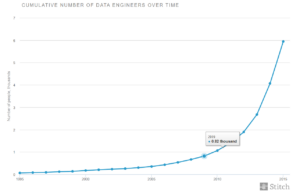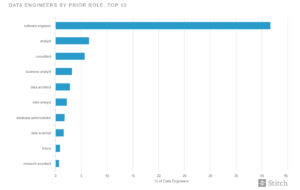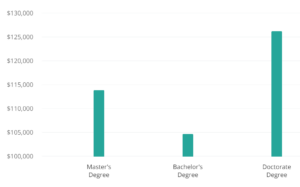Data Science and related fields of study are becoming increasingly popular in today’s corporate world. More and more companies are hiring data scientists and analysts to better understand their business metrics and performance. Within data science itself, the field of data engineering is rapidly gaining traction.
Data engineers work closely with other data professionals like scientists, analysts, and architects to draw meaningful conclusions from large, complicated data sets. As a result, data engineering has become one of the most lucrative job profiles in today’s business scenario. Naturally, countless individuals worldwide strive to get a good data engineer job.
Surprisingly, the growth rate of the number of data engineers is far higher than that of other professions like data scientists.
According to a report by Stitch Data, more than 6,500 people identify themselves as data engineers, and this number is steadily increasing. The graph below shows the abrupt increase in the number of global data engineers after the onset of the big data revolution in the 2010s.

Source: Stitch Data
However, before talking about how to get a data engineer job, you must first understand what a data engineer is and what they do.
What is a Data Engineer?
Data engineers are data professionals in charge of building and maintaining data pipelines to make them more accessible for data scientists and analysts. The groundwork for the collection, management, storage, and transformation of data within an organization is laid by data engineers. They oversee the development, design, and upkeep of database architecture and data processing systems, ensuring that the ensuing work of analysis, visualization, and the generation of machine learning models may be done in a seamless, continuous, secure, and efficient manner.
Data engineers, who serve as a vital link between traditional data science professions and software and application developers, are the most technical profiles in data science. Due to similar job requirements and responsibilities, many people find it difficult to choose the right data science position suited to their skills and qualifications.
Ryan Orban, Chief Technology Officer at Galvanize, believes that the relationship between data scientists and data engineers is similar to that of designers and front-end developers. He adds, “Just like designers are always told to learn to write some code, and front-end developers are told to get more comfortable building mockups, I encourage data scientists and data engineers to learn some subset of their counterparts’ skills.”
What Are The Roles And Responsibilities of a Data Engineer?
Data engineers are essential contributors to the creation and upkeep of any company’s data architecture. They are experts in preparing massive databases for analysts to use. The data engineer develops programs and algorithms to organize data in an appropriate layout when an analyst or a data scientist wants to evaluate information. Data engineers perform two fundamental functions:-
- ETL Processes – Developing data extraction, transformation, and loading tasks and transporting data between various environments are all included in ETL (Extract, Transform, Load) processes.
- Data Cleaning and Handling – Data cleaning procedures ensure that information reaches analysts and data scientists in a standardized and structured state.
Data Cleaning is arguably the most critical responsibility of a skilled data engineer as stated by Michael Stonebraker, adjunct professor at MIT. He says, “Without clean data, or clean enough data, your data science is worthless.“
How to Get a Data Engineer Job in 2022?
Undergraduate Degree
Getting a bachelor’s/ undergraduate degree is the primary step to getting a good data engineering job in 2022. However, candidates must carefully choose the field of study in which they want to get the undergraduate degree.
Data engineering relies heavily on mathematics and computer science, so a proficient data engineer must have a firm grasp of these two subjects. Unlike data scientists, who generally come from a statistics or mathematics background, data engineers usually have an undergraduate degree in engineering.
According to the below-mentioned infographic, roughly 42 % of data engineers have a prior background in software engineering. Even if you don’t have an undergraduate degree in computer science or software engineering, you can make up for it by undertaking a certification course on software development or computer programming.

Source: Stitch Data
Get Experience
The next step in getting a good data engineering job in 2022 is to test the knowledge you’ve gained in your undergraduate degree or a similar course. The best way to do this is by getting relevant experience in IT-based jobs at entry-level positions. As strong fluency in various programming languages will be required for your job, hone your computer programming and software design skills.
As you gain experience, start to solve real-world issues by selecting open data sets and creating an end-to-end system. To demonstrate to potential employers that you have the hard skills and persistence essential to be a data engineer, you will need to have this experience.
Get Certifications
The next step is to bolster your experience, skills, and knowledge with relevant certification courses. Many multinational corporations like IBM, Google, and Amazon provide state-of-the-art courses for data engineers who are keen to supplement their skills with additional certifications.
Today, there are a lot of popular data engineering courses around the world.
Most organizations have four levels of certification, each requiring a particular amount of relevant industry experience. The four levels of accreditation are Associate, Practitioner, Master, and Fellow. The minimum amount of work experience required in most cases is six months for the Associate level, while the Fellow level certification requires a minimum of 25 years of industry experience.
Candidates should choose the type and level of certification course per their preference and work experience.
Acquire the Necessary Skills
After getting the required certifications, data engineering candidates must focus on acquiring additional essential skills. A budding data engineering professional must be proficient in coding in multiple languages like R, Python, C/C++, Ruby Perl, Java, SAS, and MatLab. Most recruiters are looking for data engineers who are adept in multiple programming languages like those mentioned above.
Besides coding, data engineers should have a robust understanding of ETL (extract, transform, and load) systems and proficiency in using Big Data tools like MongoDB and Hadoop. According to the report by Stitch Data, SQL, Java, Python, and Hadoop are the most in-demand skills for data engineers.
Get a Higher Degree
Higher education can greatly benefit data engineers and propel their careers dramatically. A report by Zippia suggests that data engineers with a doctoral degree are more likely to earn more than those who only have a bachelor’s or master’s degree. The same report mentions that data engineers with a doctorate earn $126,296 annually. Meanwhile, data engineering professionals with a master’s degree have a median annual income of $113,955; those with a bachelor’s degree earn $104,713 annually on average.

Source: Zippia
Build a Compelling Resume
Finally, the last step in getting a good data engineer job in 2022 is to build an attractive resume that showcases your qualifications, skills, and competitions effectively. A knowledgeable data engineering candidate can miss out on a job because of having a subpar resume that fails to convey the message to a potential employer. Hiring managers have to deal with hundreds of applications for a single job opening, and candidates must do everything they can to stand out from the crowd.
The perfect resume of a data engineering candidate will highlight their key strengths and critical areas where they excel. It should focus on the relevant skills, work experience, and certifications earned by the candidate and convey the same to the recruiter. A well crafted resume gives a competitive edge to deserving data engineering candidates who want to land a well-paid job with a reputable company.
Closing Words
Data engineers, along with data scientists and analysts, are among the fastest growing job profiles globally. They are necessary for corporations that rely heavily on Big Data and related technologies and use data-driven methods to improve their business operations. Consequently, candidates often find it challenging to land a good data engineering job that pays well and is suited to their skills and qualifications.
Contact BenchPoint today. Our company is a pioneer in healthcare IT recruitment with established competence in the field, for additional information on how to find a good data engineering job.
Your dream job is within reach, all you need to do is reach out to us.
